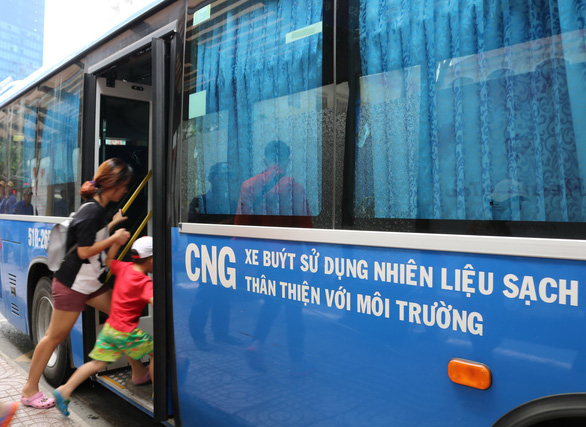Ho Chi Minh City’s plan to replace diesel-fueled buses with eco-friendly ones that run on compressed natural gas (CNG) is confronted by a huge setback as the sole supplier of the ‘green’ fuel has announced plans to cut 20-30 percent of its supply for buses and reserve the resource for electric generation.
The southern hub has planned on having 75 percent of its projected fleet of 3,100 buses run on CNG by 2020, in an effort to curb pollution.
Less than 18 percent of the city’s 2,457 public buses currently run on the eco-friendly fuel, and officials say meeting the target by 2020 is a far-fetched goal given the monopoly in CNG supply.
CNG combustion produces fewer undesirable gases than gasoline or diesel fuel.
Petro Vietnam Southern Gas JSC (PV Gas South), a subsidiary of state-run Vietnam Oil and Gas Group (PVN), is the sole supplier of CNG for buses in Ho Chi Minh City.
In May, PV Gas South announced that it planned to cut 20-30 percent of its CNG supply for buses in the city for the remainder of 2019 to reserve the fuel for electric generation in case there was a request from the Ministry of Industry and Trade.
It said that in such a scenario, two hours’ notice will be given to bus operators so they can adjust their schedules.
The municipal transport department has said a CNG shortage would jeopardize public transport in the city and discourage bus operators from replacing diesel-fueled vehicles with eco-friendly ones.
It has asked PVN to make sure PV Gas South does not curtail its CNG supply for Ho Chi Minh City buses in 2019.
This is not the first time PV Gas South has abused its monopoly as the city’s sole CNG supplier to gain the upper hand in negotiations with buyers.
In November 2011, less than three months after the first CNG buses were launched in Ho Chi Minh City, PV Gas South announced it was raising the fuel's prices, causing uproar among local bus companies.
Earlier this year, a branch of PV Gas South sent an ‘ultimatum’ to some bus companies in Ho Chi Minh City threatening to terminate its CNG supply if the buyers did not agree to a new, higher price scheme.
A simple solution to this problem would be to erase PV Gas South’s monopoly and allow at least two to three CNG suppliers to compete for the market share, said Cao Thanh Binh, deputy head of the municipal People’s Council Economic and Budget Commission.
Russia-invested PVGazProm Natural Gas For Vehicles LLC has already registered to become a CNG supplier to Ho Chi Minh City buses, with their service expected to become available in 2020.
Like us on Facebook or follow us on Twitter to get the latest news about Vietnam!





















































